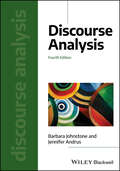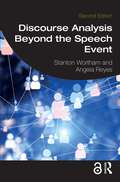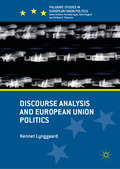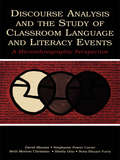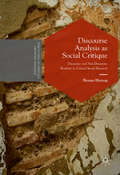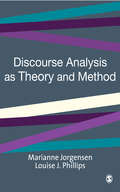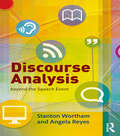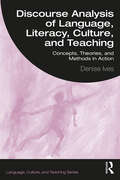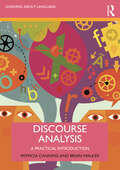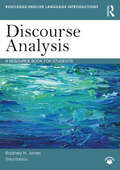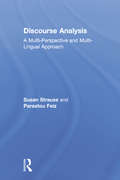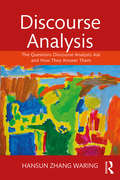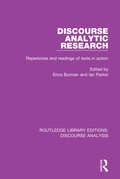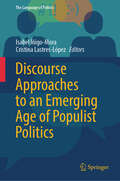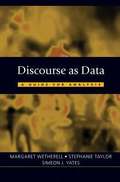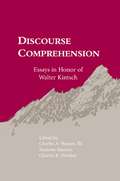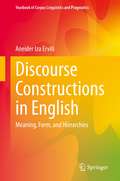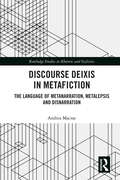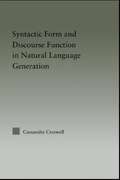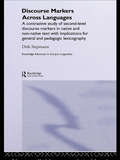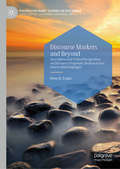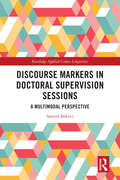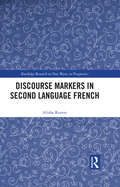- Table View
- List View
Discourse Analysis
by Gillian Brown George YuleDiscourse analysis is a term which has come to have different interpretations for scholars working in different disciplines. For a sociolinguist, it is concerned mainly with the structre of social interaction manifested in conversation; for a psycholinguist, it is primarily concerned with the nature of comprehension of short written texts; for the computational linguist, it is concerned with producing operational models of text-understanding within highly limited contexts. In this textbook, the authors provide an extensive overview of the many and diverse approaches to the study of discourse, but base their own approach centrally on the discipline which, to varying degrees, is common to them all - linguistics. Using a methodology which has much in common with descriptive linguistics, they offer a lucid and wide-ranging account of how forms of language are used in communication. Their principal concern is to examine how any language produced by man, whether spoken or written, is used to communicate for a purpose in a context. The discussion is carefully illustrated throughout by a wide variety of discourse types (conversations recorded in different social situations, extracts from newspapers, notices, contemporary fiction, graffiti, etc. ). The techniques of analysis are described and exemplified in sufficient detail for the student to be able to apply them to any language in context that he or she encounters. A familiarity with elementary linguistics is assumed, but the range of issues discussed in conjunction with the variety of exemplification presented will make this a valuable and stimulating textbook not only for students of linguistics, but for any reader who wishes to investigate the principles underlying the use of language in natural contexts to communicate and understand intended meaning.
Discourse Analysis (Introducing Linguistics)
by Barbara Johnstone Jennifer AndrusA new edition of the bestselling textbook on discourse analysis, ideal for undergraduate and graduate courses in linguistics and the broader humanities and social sciences Discourse Analysis explains how to collect and analyze spoken, written, and multimodal language. Now in its fourth edition, this popular textbook encourages students to think systematically and critically about different sources of discourse to better understand why spoken utterances and written texts have the meanings and uses they do. Throughout the book, the authors offer real-life examples of what discourse analysis can reveal about language, individuals, groups, and society. Student-friendly chapters describe discourse analysis with a goal of helping students master the fundamental concepts of this important area of linguistic research. Each chapter contains discussion questions that encourage students to relate the material to their own experiences, perform their own analyses, and consider important issues in research design and research ethics. The new edition of Discourse Analysis includes new discussion questions and ideas for research projects, up-to-date supplementary readings, and expanded discussions of corpus analysis methods, rhetorical legitimation, and social identities. This textbook: Teaches students to apply discourse analysis to answer research questions in disciplines across the humanities and social sciences Explains the complex relationships between discourse and various aspects of context, such as linguistic structure, participants, and prior discourse Provides instructors with the flexibility to re-order chapters to meet the needs of their students Features exercises that incorporate extensive data from a variety of languages and situations, including discourse in electronic media Contains discussion questions, activities, research projects suggestions, further readings, chapter summaries, and other pedagogical featuresDiscourse Analysis, Fourth Edition, remains the ideal primary text for undergraduate and graduate courses in language and linguistics, language pedagogy, rhetoric and composition, and linguistic ethnography.
Discourse Analysis Beyond the Speech Event
by Stanton Wortham Angela ReyesIn its first edition, winner of the 2016 Edward Sapir Book Prize from the Society for Linguistic Anthropology of the American Anthropological Association Discourse Analysis Beyond the Speech Event introduces a new approach to discourse analysis. In this innovative work, Wortham and Reyes argue that discourse analysts should look beyond fixed speech events and consider the development of discourses over time. Drawing on theories and methods from linguistic anthropology and related fields, this book is the first to present a systematic methodological approach to conducting discourse analysis of linked events, allowing researchers to understand not only individual events but also the patterns that emerge across them. This new edition: Draws on theories and methods from linguistic anthropology and related fields; Presents the first systematic methodological approach to doing discourse analysis of linked events; Provides easy-to-use tools and techniques for analyzing discourse both within and across events; Offers transparent procedures and clear illustrations to show how the approach can be applied to analyze three types of data: ethnographic, archival, and new media; Includes a new chapter focusing on the discourse analysis of contemporary nationalist new media data. Updated and revised for the second edition, this book is essential reading for advanced students and researchers working in the area of discourse analysis.
Discourse Analysis Beyond the Speech Event
by Stanton Wortham Angela ReyesIn its first edition, winner of the 2016 Edward Sapir Book Prize from the Society for Linguistic Anthropology of the American Anthropological AssociationDiscourse Analysis Beyond the Speech Event introduces a new approach to discourse analysis. In this innovative work, Wortham and Reyes argue that discourse analysts should look beyond fixed speech events and consider the development of discourses over time. Drawing on theories and methods from linguistic anthropology and related fields, this book is the first to present a systematic methodological approach to conducting discourse analysis of linked events, allowing researchers to understand not only individual events but also the patterns that emerge across them.This new edition: Draws on theories and methods from linguistic anthropology and related fields; Presents the first systematic methodological approach to doing discourse analysis of linked events; Provides easy-to-use tools and techniques for analyzing discourse both within and across events; Offers transparent procedures and clear illustrations to show how the approach can be applied to analyze three types of data: ethnographic, archival, and new media; Includes a new chapter focusing on the discourse analysis of contemporary nationalist new media data. Updated and revised for the second edition, this book is essential reading for advanced students and researchers working in the area of discourse analysis.
Discourse Analysis and European Union Politics (Palgrave Studies in European Union Politics)
by Kennet LynggaardThis book reflects on the latest developments in discourse analysis in the context of EU politics research. It explores discourse analysis as a tool to study and understand EU politics, covering key conceptual, methodological and research-strategic questions. The analytical approach advanced in this book is anchored in discursive institutionalism, the newest addition to approaches in new institutionalism. The author particularly focuses on discourse as a strategic resource for political purposes, as a device for inclusion and exclusion in policy-making, and as a means of conveying and appealing to political emotions, as well as the role visual discourse and imagery play in day-to-day EU politics. Including a variety of examples using different combinations of research techniques and data material, the book also addresses issues related to the study of discursive structures and agency, discourse conflict and consensus, causality and the time dimension in discourse analysis.
Discourse Analysis and the Study of Classroom Language and Literacy Events: A Microethnographic Perspective
by David Bloome Stephanie Power Carter Beth Morton Christian Sheila Otto Nora Shuart-FarisThe authors present a social linguistic/social interactional approach to the discourse analysis of classroom language and literacy events. Building on recent theories in interactional sociolinguistics, literary theory, social anthropology, critical discourse analysis, and the New Literacy Studies, they describe a microethnographic approach to discourse analysis that provides a reflexive and recursive research process that continually questions what counts as knowledge in and of the interactions among teachers and students. The approach combines attention to how people use language and other systems of communication in constructing classroom events with attention to social, cultural, and political processes. The focus of attention is on actual people acting and reacting to each other, creating and recreating the worlds in which they live. One contribution of the microethnographic approach is to highlight the conception of people as complex, multi-dimensional actors who together use what is given by culture, language, social, and economic capital to create new meanings, social relationships and possibilities, and to recreate culture and language. The approach presented by the authors does not separate methodological, theoretical, and epistemological issues. Instead, they argue that research always involves a dialectical relationship among the object of the research, the theoretical frameworks and methodologies driving the research, and the situations within which the research is being conducted. Discourse Analysis and the Study of Classroom Language and Literacy Events: A Microethnographic Perspective: *introduces key constructs and the intellectual and disciplinary foundations of the microethnographic approach; *addresses the use of this approach to gain insight into three often discussed issues in research on classroom literacy events--classroom literacy events as cultural action, the social construction of identity, and power relations in and through classroom literacy events; *presents transcripts of classroom literacy events to illustrate how theoretical constructs, the research issue, the research site, methods, research techniques, and previous studies of discourse analysis come together to constitute a discourse analysis; and *discusses the complexity of "locating" microethnographic discourse analysis studies within the field of literacy studies and within broader intellectual movements. This volume is of broad interest and will be widely welcomed by scholars and students in the field language and literacy studies, educational researchers focusing on analysis of classroom discourse, educational sociolinguists, and sociologists and anthropologists focusing on face-to-face interaction and language use.
Discourse Analysis as Social Critique
by Benno HerzogThis book presents post-Marxist theoretical approaches towards social critique and offers discourse analytical tools for critical research. How is a normative critique possible? The author, working at the crossroads of sociological discourse analysis and social philosophy, answers this question and others to show how empirical discourse research can be used to develop normative critique of societies. Divided into three major sections, Herzog introduces the reader to the theoretical approaches to critique, provides tools for normative evaluations of social structures, and finally offers practical examples of theoretical concepts. The book will be of interest to those working in the fields and subfields of discourse analysis, poststructuralism, hegemony theory, cultural political economy and critical theory, with an interdisciplinary orientation.
Discourse Analysis as Theory and Method
by Marianne W Jorgensen Dr Louise J PhillipsDiscourse Analysis as Theory and Method is a systematic introduction to discourse analysis as a body of theories and methods for social research. It brings together three central approaches, Laclau and Mouffe's discourse theory, critical discourse analysis and discursive psychology, in order to establish a dialogue between different forms of discourse analysis often kept apart by disciplinary boundaries. The book introduces the three approaches in a clear and easily comprehensible manner, explaining the distinctive philosophical premises and theoretical perspectives of each approach as well as the methodological guidelines and tools they provide for empirical discourse analysis. The authors also demonstrate the possibilities for combining different discourse analytical and non-discourse analytical approaches in empirical study. Finally, they contextualize discourse analysis within the social constructionist debate about critical social research, rejecting the view that a critical stance is incompatible with social constructionist premises and arguing that critique must be an inherent part of social research.
Discourse Analysis beyond the Speech Event
by Stanton Wortham Angela ReyesDiscourse Analysis beyond the Speech Event introduces a new approach to discourse analysis. In this innovative work, Wortham and Reyes argue that discourse analysts should look beyond fixed speech events and consider the development of discourses over time. Drawing on theories and methods from linguistic anthropology and related fields, this book is the first to present a systematic methodological approach to conducting discourse analysis of linked events, allowing researchers to understand not only individual events but also the patterns that emerge across them. Discourse Analysis beyond the Speech Event Provides a method for detailed examination of speech, writing and other communication Introduces students and researchers to the discourse analytic tools and techniques required to analyse the relationships between discourse events Offers explicit guidelines that direct the reader through different stages of discourse analytic research, including worked examples from conversation, magazines and social media Incorporates sample analyses from ethnographic, archival and new media data. This book is essential reading for advanced students and researchers working in the area of discourse analysis.
Discourse Analysis of Language, Literacy, Culture, and Teaching: Concepts, Theories, and Methods in Action (Language, Culture, and Teaching Series)
by Denise IvesAn essential text on discourse theory and analytic methods, this book demonstrates the possibilities of using discourse analysis to better understand language, literacy, culture, and teaching. Each chapter provides coherent, extended examples of individuals engaged in the process of doing discourse analysis. The narrative approach highlights the individual experiences of the discourse analysts and provides a unique, inside-the-mind view of the process and choices along the way. Across the book, stories describe processes involved in analyses, including identifying aims, formulating questions, selecting discourse, transcribing oral and multimodal discourse, translating discourse, chunking discourse, choosing and applying discourse and other theory, generating and supporting claims, and communicating findings. Chapters also feature sidebars with key theories and methods, recommended readings, and additional resources. This book is ideal for courses on discourse analysis, qualitative research, or language, literacy, culture, and teaching. Readers are invited to imagine the possibilities for using discourse analysis to answer their own questions.
Discourse Analysis: A Practical Introduction (Learning about Language)
by Brian Walker Patricia CanningDiscourse Analysis provides an essential and practical introduction for students studying modules on the analysis of language in use. It explores the ways in which language is used and organised in written and spoken texts to generate meanings and takes into account the social contexts of production, and the social roles and identities of those involved. Investigating the ways in which language varies according to subject, social setting, and communicative purpose, this book examines various forms of speaking and writing, including casual conversation, speeches, parliamentary debate, computer-mediated communication, and mass media articles. It discusses topics including how we convey more than we actually say or write, the role of politeness and impoliteness in communication, and what makes texts cohesive and coherent. It also shows how particular aspects of discourse analysis can be assisted by corpus methods and tools. Taking students through a step-by-step guide on how to do discourse analysis that includes the collection of data and presentation of results, the book also documents a text analysis project from start to finish. Featuring a range of examples and interactive activities, as well as additional online support material, this book is key reading for those studying discourse analysis modules.
Discourse Analysis: A Resource Book for Students (Routledge English Language Introductions)
by Rodney H. JonesRoutledge English Language Introductions cover core areas of language study and are one-stop resources for students. Assuming no prior knowledge, books in the series offer an accessible overview of the subject, with activities, study questions, sample analyses, and commentaries.Revised and updated throughout, the new edition of Discourse Analysis provides a comprehensive overview of the major approaches to and methodological tools used in discourse analysis. This textbook: introduces both traditional perspectives on the analysis of texts and talk as well as more recent approaches that address technologically mediated and multimodal discourse incorporates practical examples using real data, now revised to include more diverse examples from a wider range of countries includes a revised final section to highlight recent research with case studies showcasing examples of how scholars used the principles illustrated in the book is accompanied by online support material with additional student activities, summaries, explanations, and useful links Other features of the new edition include updated references and a wider range of material from social media that includes TikTok and other more recently popular platforms. Written by an experienced teacher and author, this accessible textbook is essential reading for all students of English language and linguistics.
Discourse Analysis: Putting Our Worlds into Words
by Susan Strauss Parastou FeizThis introductory textbook presents a variety of approaches and perspectives that can be employed to analyze any sample of discourse. The perspectives come from multiple disciplines, including linguistics, sociolinguistics, and linguistic anthropology, all of which shed light on meaning and the interactional construction of meaning through language use. Students without prior experience in discourse analysis will appreciate and understand the micro-macro relationship of language use in everyday contexts, in professional and academic settings, in languages other than English, and in a wide variety of media outlets. Each chapter is supported by examples of spoken and written discourse from various types of data sources, including conversations, commercials, university lectures, textbooks, print ads, and blogs, and concludes with hands-on opportunities for readers to actually do discourse analysis on their own. Students can also utilize the book’s comprehensive companion website, with flash cards for key terms, quizzes, and additional data samples, for in-class activities and self-study. With its accessible multi-disciplinary approach and comprehensive data samples from a variety of sources, Discourse Analysis is the ideal core text for the discourse analysis course in applied linguistics, English, education, and communication programs.
Discourse Analysis: The Questions Discourse Analysts Ask and How They Answer Them
by Hansun Zhang WaringDiscourse Analysis: The Questions Discourse Analysts Ask and How They Answer Them is the first introductory text organized around the kinds of questions discourse analysts ask and how they are systematically addressed by analysts of different empirical persuasions, thereby cultivating a principled understanding of the interdisciplinary field of discourse analysis. The text promotes synthesis, integration, and a multidimensional understanding of the core issues that preoccupy discourse analysts. (1) How is discourse structured? (2) How are social actions accomplished in discourse? (3) How are identities negotiated in discourse? (4) How are ideologies constructed in discourse? The answer to each question is illustrated with transcripts and analyses of actual discourse as exemplified in key studies in the field. With a range of other features such as boxed definitions, study questions, and analytical tasks, this guide to the complex world of discourse is an ideal resource for courses on discourse analysis.
Discourse Analytic Research: Repertoires and readings of texts in action (RLE: Discourse Analysis)
by Erica Burman Ian ParkerFirst published in 1993, this book provides clear illustrations of discourse analytic work and empirical critiques of the traditional psychological approaches. Drawing on a range of examples, the contributors argue that identity, deeply felt emotions, prejudice, and attitudes to social issues are created by the language that describes them rather than being intrinsic to the individual. In illustrating the variety of methods available through their studies of punk identity, sexual jealousy, images of nature, political talk, sexism in radio, education case conferences and occupational choice, the contributors provide a challenging presentation of discourse analysis in a psychological context.
Discourse Approaches to an Emerging Age of Populist Politics (The Language of Politics)
by Isabel Íñigo-Mora Cristina Lastres-LópezThis book presents a collection of studies related to populism in contemporary political discourse. Following growing scholarly interest in the topic, this volume offers a wide panorama on the discursive construction of populism across the political spectrum worldwide. International experts from different backgrounds provide a comprehensive analysis of populist communication in present-day politics. Each chapter in the book constitutes a case study from a different country, altogether offering a global perspective on the construction of populism in political discourse. In particular, the book presents studies from fourteen different countries across the globe: Belgium, France, Spain, the United States of America, Portugal, Montenegro, Italy, Ghana, the United Kingdom, Turkey, Japan, Russia, Poland, and Israel. Here, readers can (1) get acquainted with discourse on populism in the media; (2) have access to ample descriptions of populist communication strategies across frontiers; (3)explore populist discourse by contemporary societies’ well-known political leaders from different countries; and (4) examine the intertwining of populism, policymaking, and religion. Rooted in different frameworks, the various chapters offer a comprehensive understanding of the complex phenomenon of populism. The volume also enables the reader to globally grasp similarities and differences in the way populist discourse is built from West to East. International and interdisciplinary approaches form the cornerstone of this volume that will appeal to scholars from diverse academic backgrounds.
Discourse As Data: A Guide For Analysis (Published In Association With The Open University Series)
by Margaret Wetherell Simeon J. Yates Stephanie TaylorThis workbook will be invaluable for students across the social sciences who need to learn how to analyze discourse. Using a step-by-step approach, students are introduced to the principal range of methods for analyzing different types of text, taken through key analytic concepts, offered specimen analyses and given the opportunity to try out analytic concepts on new data. Discourse as Data is organized around eight chapters, six of which are related to the domains covered in the Reader, and top and tailed by two chapters which set up common methodological issues in discourse research relevant to all approaches (such as transcription and the application and the critical evaluation of discourse research).
Discourse Comprehension: Essays in Honor of Walter Kintsch
by Suzanne Mannes Charles R. Fletcher Charles A. WeaverThis volume is derived from presentations given at a conference hosted in Boulder, Colorado in honor of the 60th birthday of Walter Kintsch. Though the contents of the talks, and thus the chapters, varied widely, all had one thing in common -- they were inspired to some degree by the work of Walter Kintsch. When making plans for an edited book centered around this conference, the editors had a primary goal: to acknowledge the wide variety of researchers and research areas Kintsch had influenced. As a consequence, one of the more unusual elements of this volume is the diversity of the contributors. Researchers from six different countries contributed chapters to this book which is loosely organized around three main thrusts of Kintsch's work: * text-based representations that explain how meaning in a text is constructed, * situation models which represent what the text is about rather than what a text literally says, and * the construction-integration model, Kintsch's most recent work in discourse comprehension.
Discourse Constructions in English: Meaning, Form, and Hierarchies (Yearbook of Corpus Linguistics and Pragmatics)
by Aneider Iza ErvitiThis book emphasizes the advantages of examining discourse connectivity from a constructionist perspective and highlights the role of discourse configurations in the construction of meaning. The research contained advances the field of cognitive classification and categorization of discourse constructions. The text is a great improvement in the discourse analysis literature, since it uniquely clarifies the subtleties of meaning between different discourse markers that are frequently treated as equivalent by lexicographers. It is unique in being the first contribution to the creation of a Constructicon at the discourse level and it fills an important gap within cognitively oriented constructionist accounts that have mostly restricted their analyses to argument-structure and illocutionary constructions. This yearbook appeals to students and researchers working within corpus linguistics.
Discourse Deixis in Metafiction: The Language of Metanarration, Metalepsis and Disnarration (Routledge Studies in Rhetoric and Stylistics)
by Andrea MacraeThis volume advances scholarly understanding of the ways in which discourse deixis underpins the workings of metafictional novels. Building on existing scholarship in the field, the book begins by mapping out key themes and techniques in metafiction and puts forward a focused and theoretically coherent account of discourse deixis—language which points to a section or aspect of the discourse context in which that language is used—in written literary discourse, highlighting its inherent significance in metafiction specifically. Macrae takes readers through an exploration of discourse deixis as used within the techniques of metanarration, metalepsis, and disnarration, drawing on a mix of both well-established and lesser-known metafictional novels from the late 1960s and early 1970s by such authors as John Barth, Brigid Brophy, Robert Coover, John Fowles, Steve Katz, and B.S. Johnson. This comprehensive account integrates and develops a new approach to understanding discourse deixis and innovative insights into metafictionality more broadly and will be of particular interest to scholars in literary studies, postmodern literature, narratology, and stylistics.
Discourse Function & Syntactic Form in Natural Language Generation (Outstanding Dissertations in Linguistics)
by Cassandre CreswellUsers of natural languages have many word orders with which to encode the same truth-conditional meaning. They choose contextually appropriate strings from these many ways with little conscious effort and with effective communicative results. Previous computational models of when English speakers produce non-canonical word orders, like topicalization, left-dislocation and clefts, fail. The primary goal of this book is to present a better model of when speakers choose to produce certain non-canonical word orders by incorporating the effects of discourse context and speaker goals on syntactic choice. This book makes extensive use of previously unexamined naturally occurring corpus data of non-canonical word order in English, both to illustrate the points of the theoretical model and to train the statistical model.
Discourse Markers Across Languages: A Contrastive Study of Second-Level Discourse Markers in Native and Non-Native Text with Implications for General and Pedagogic Lexicography (Routledge Advances in Corpus Linguistics)
by Siepmann DirkThis book offers a corpus-based comparative study of an almost entirely unexplored set of multi-word lexical items serving pragmatic or text-structuring functions. Part One provides a descriptive account of multi-word discourse markers in written English, French and German, focussing on dicussion of interlingual equivalence. Part Two examines the use of multi-word markers by non-native speakers of English and discusses lexicographical and pedagogical implications.
Discourse Markers and Beyond: Descriptive and Critical Perspectives on Discourse-Pragmatic Devices across Genres and Languages (Postdisciplinary Studies in Discourse)
by Péter B. FurkóThis book explores the use of discourse markers - lexical items where drawing a distinction between propositional and non-propositional, syntactically-semantically integrated and discourse-pragmatic uses is especially relevant. Using a combination of qualitative and quantitative methodologies, descriptive and critical (CDA) perspectives, and manual annotation and automatized analyses, the author argues that Discourse Markers (DMs) cannot be effectively studied in isolation, but must instead be contextualised with reference to other discourse-pragmatic devices and their language and genre backgrounds. This book will be of interest to students and academics working in the fields of DM research and critical discourse studies, and will also appeal to scholars working in areas such as genre studies, second language acquisition (SLA), literary analysis, contemporary cinematography, Tolkien scholarship, and Bible studies.
Discourse Markers in Doctoral Supervision Sessions: A Multimodal Perspective (Routledge Applied Corpus Linguistics)
by Samira BakeerLanguage is a complex system that transfers ideas, feelings, experiences, beliefs, and cultures to others. One of the interactional resources that are utilised to make this transmission more coherent and effective is Discourse Markers (DMs). This monograph analyses these markers in doctoral supervisions but uses a multimodal approach to provide a deeper understanding of these DMs and uncovers potential hidden meanings that would escape a purely verbal analysis. Using a dataset consisting of a corpus of video-recorded doctoral supervision meetings, this book provides an innovative and cutting-edge approach to the analysis of DMs and sheds new light on the complexity and dynamicity of naturally occurring discourse where meaning-making rests on a close coordination of both verbal and embodied conducts. The book makes very useful reading for scholars in the fields of discourse markers, conversation analysis, corpus linguistics and multimodality. It could collaterally be appealing to anyone simply interested in the study of human communication.
Discourse Markers in Second Language French (Routledge Research on New Waves in Pragmatics)
by Alisha ReavesThis book provides an in-depth look at pragmatic development by second language learners of French through their production of French discourse markers. It showcases a holistic production-focused approach designed to provide a broad picture of learner discourse marker use in French. The book begins with a comprehensive description of the major theoretical frameworks in discourse marker research. It provides a detailed analysis of prior second language research on discourse markers in several languages and the dominant avenues of inquiry. Additionally, this book engages in a discussion of methodology that can serve as a guide for future researchers on the topic. The data presented in this book provide a broad picture of both native speaker and learner production of discourse markers with implications for theoretical and formal understandings of pragmatic meaning. This book will be of particular interest to scholars in pragmatics for both second language acquisition and formal or theoretical perspectives.

